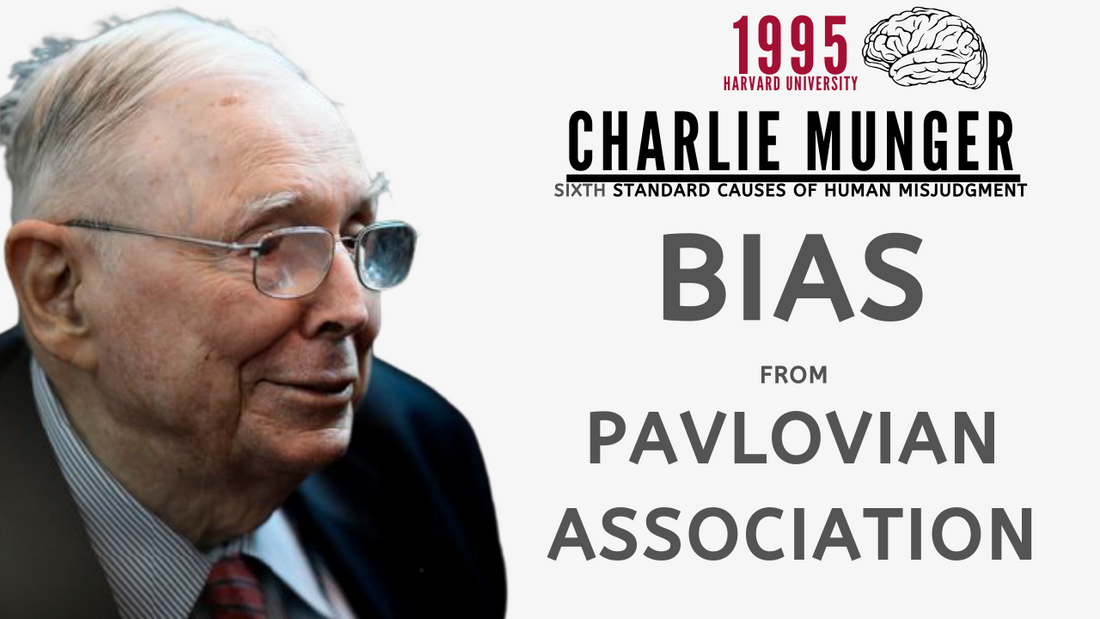
Charlie Munger on Bias from Pavlovian Association. | Harvard University 1995【C:C.M Ep.75】
[Transcript]
CHARLIE MUNGER: Sixth. Bias from Pavlovian association, misconstruing past correlation as a reliable basis for decision-making. I never took a course in psychology, or economics either for that matter, but I did learn about Pavlov in high school biology. And the way they taught it, you know, so the dog salivated when the bell rang. So what? Nobody made the least effort to tie that to the wide world. Well, the truth of the matter is that Pavlovian association is an enormously powerful psychological force in the daily life of all of us. And, indeed, in economics we wouldn’t have money without the role of so-called secondary reinforcement, which is a pure psychological phenomenon demonstrated in the laboratory.
Practically, I’d say 3/4 of advertising works on pure Pavlov. Think how association, pure association, works. Take Coca-Cola company we’re the biggest share-holder. They want to be associated with every wonderful image, heroics in the Olympics, wonderful music, you name it. They don’t want to be associated with Presidents’ funerals and so forth. When have you seen a Coca-Cola ad, and the association really works.
And all these psychological tendencies work largely or entirely on a subconscious level, which makes them very insidious. Now you’ve got Persian messenger syndrome. The Persians really did kill the messenger who brought the bad news. You think that is dead? I mean you should’ve seen Bill Paley in his last 20 years. He didn’t hear one damn thing he didn’t want to hear. People knew that it was bad for the messenger to bring Bill Paley things he didn’t want to hear. Well that means that the leader gets in a cocoon of unreality, and this is a great big enterprise, and boy, did he make some dumb decisions in the last 20 years.
And now the Persian messenger syndrome is alive and well. When I saw, some years ago, Arco and Exxon arguing over a few hundred millions of ambiguity in their North Slope treaties before a superior court judge in Texas, with armies of lawyers and experts on each side. Now this is a Mad Hatter’s tea party, two engineering-style companies can’t resolve some ambiguity without spending tens of millions of dollars in some Texas superior court? In my opinion, what happens is that nobody wants to bring the bad news to the executives up the line. But here’s a few hundred million dollars you thought you had that you don’t. And it’s much safer to act like the Persian messenger who goes away to hide rather than bring home the news of the battle lost.
Talking about economics, you get a very interesting phenomenon that I’ve seen over and over again in a long life. You’ve got two products, suppose they’re complex, technical products. Now you’d think, under the laws of economics, that if product A costs X, if product Y costs X minus something, it will sell better than if it sells at X plus something, but that’s not so. In many cases when you raise the price of the alternative products, it’ll get a larger market share than it would when you make it lower than your competitor’s product.
That’s because the bell, a Pavlovian bell, I mean ordinarily there’s a correlation between price and value, then you have an information inefficiency. And so when you raise the price, the sales go up relative to your competitor. That happens again and again and again. It’s a pure Pavlovian phenomenon. You can say, “Well, the economists have figured this sort of thing out when they started talking about information inefficiencies,” but that was fairly late in economics that they found such an obvious thing. And, of course, most of them don’t ask what causes the information inefficiencies.
Well, one of the things that cause it is pure old Pavlov and his dog. Now you’ve got bios from Skinnerian association, operant conditioning, you know, where you give the dog a reward and pound in the behavior that preceded the dog’s getting the award. And, of course, Skinner was able to create superstitious pigeons by having the rewards come by accident with certain occurrences, and, of course, we all know people who are the human equivalents of superstitious pigeons. That’s a very powerful phenomenon. And, of course, operant conditioning really works. I mean the people in the center who think that operant conditioning is important are very much right, it’s just that Skinner overdid it a little.
Where you see in business just perfectly horrible results from psychologically rooted tendencies is in accounting. If you take Westinghouse, which blew, what, two or three billion dollars pre-tax at least loaning developers to build hotels, and virtually 100% loans? Now you say any idiot knows that if there’s one thing you don’t like it’s a developer, and another you don’t like it’s a hotel.
And to make a 100% loan to a developer who’s going to build a hotel. But this guy, he probably was an engineer or something, and he didn’t take psychology any more than I did, and he got out there in the hands of these slick salesmen operating under their version of incentive-caused bias, where any damned way of getting Westinghouse to do it was considered normal business, and they just blew it.
That would never have been possible if the accounting system hadn’t been such but for the initial phase of every transaction it showed wonderful financial results. So people who have loose accounting standards are just inviting perfectly horrible behavior in other people. And it’s a sin, it’s an absolute sin. If you carry bushel baskets full of money through the ghetto, and made it easy to steal, that would be a considerable human sin, because you’d be causing a lot of bad behavior, and the bad behavior would spread. Similarly, an institution that gets sloppy accounting commits a real human sin, and it’s also a dumb way to do business, as Westinghouse has so wonderfully proved.
Oddly enough nobody mentions, at least nobody I’ve seen, what happened with Joe Jett and Kidder Peabody. The truth of the matter is the accounting system was such that by punching a few buttons, the Joe Jetts of the world could show profits, and profits that showed up in things that resulted in rewards and esteem and every other thing that human being. Well, the Joe Jetts are always with us, and they’re not really to blame, in my judgment at least. But that bastard who created that foolish accounting system who, so far as I know, has not been flayed alive, ought to be.
(Source: https://youtu.be/07f8oasWqWg)
[YAPSS Takeaway]
This article might help you to have a better understanding on what Charlie is talking about:
https://fs.blog/2015/08/bias-from-association-why-we-shoot-the-messenger/
Train yourself to hear what's unpleasant.
